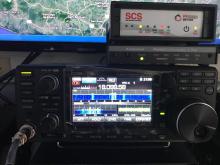Amateur Radio Safety Foundation, Inc.
Winlink Global Radio Email®️ is an all-volunteer project of the Amateur Radio Safety Foundation, Inc. (ARSFI), a non-profit public benefit corporation with no beneficial owners.
Please give to ARSFI if you use Winlink radio email or correspond regularly with someone who does. By donating $25 each year you will do your part to improve this system and keep it running. Donations are tax-deductible by most US federal taxpayers. This is the best way to say "thank you" to Winlink volunteers! You can also purchase a registration key for your Winlink Express software. That's different than a donation! And is another way to contribute.
WANTED:
Software and Hardware Developers
The Winlink Development Team is looking for talented software and hardware developers who have expertise in Digital Signal Processing, embedded firmware, RTOS, VB, C#, C, C++, dot-Net Core, Python, JavaScript, OSX, iOS, Android, Open-Source Project Management, GitHub and AWS experience. We need PCB Designer, fabricator and supply chain expertise. We need developers who can move our programs to new platforms and environments, keep pace with internet mail and security standards, and to help innovate for the future. If you have volunteer time, are willing to help, work well with others and would like to join an accomplished team, please contact Mooneer Salem, K6AQ, and Tom Lafleur, KA6IQA.
The Winlink Development Team
The Winlink radio email system and software are built, maintained and supported entirely by volunteers.
Victor D. Poor, W5SSM (SK)
Rick Muething, KN6KB
Lee Inman, K0QED
Phil Sherrod, W4PHS
Steve Waterman, K4CJX
Scott Dakers, W7SGD
Tom Lafleur, KA6IQA
Lor Kutchins, W3QA
Ross Merlin, WA2WDT
Chris Steinhardt, KD9LF
Neil Hughes, VE1YZ
Scott Miller, K6SKM
Mike Burton, XE2/N6KZB (SK)
Jonathan Remba, XE1BRX
Greg Kruckewitt, KG6SJT
Mooneer Salem, K6AQ
Kevin Hedgepeth, NB7O
Tom Whiteside, N5TW
Gerhard Kmet, OE3ZK (SK)
Scott Currie, NS7C
Thomas Noel, KF7RSF
John Wiseman, G8BPQ
Van Malan, NH7IT
Contacts
See the SUPPORT main menu link above!
User Support (especially for account and password issues), and Gateway Sysops, tech support and help: Click this link, then click the appropriate link for the client program you use, or use this link:
https://groups.google.com/forum/#!forum/winlink-programs-group
Internet mail server adminstrators, mail server errors and internet routing issues: the Winlink Postmaster. USERS: Please do not look for user support here!
Official Business only, Winlink/ARSFI: Steve Waterman, K4CJX, Winlink Administrator
Outstanding Volunteers
The Winlink system is run entirely by volunteers. Those called Gateway Station Sysops, who support and run over a thousand stations around the world, are special. They are essential for providing the radio network that allows us to use Winlink radio email. Without them, there is no Winlink. If you use Winlink radio email, make sure to thank your sysops by sending them an email to their RMSCALLSIGN-at-winlink.org address.You can find their contact information by mousing over their call sign on the RMS List tab here.
Apart from the Gateway Station Sysops and Development Team, there are other volunteers that run e-mail groups and tutorials, manage user accounts, register software, update the network's assets and catalogs, test and debug products, provide training, and independently write software. They all work together to keep the Winlink system running smoothly. Thank you to all the hardworking volunteers, authors and developers who contribute to the Winlink system. Some are exceptional and deserve special praise:
Oliver Dully, K6OLI
Jim Price, KO6GM
Gordon Gibby, KX4Z
Jim Corenman, KE6RK
Georges Auberger, WH6AZ
Jose Alberto Nieto Ros, EA6HVK
Don Felgenhauer, K7BFL
David W. Barrow III, N9UNR (SK)
Bill Kuechler, N9ACQ
Bud Thompson, N0IA
Chris Mattia, W6AH
David Goldenberg, W0DHG
Dan Tomlinson, NR6V
David Ouellette, WB8MWG
Dan Midyett, KA4CAH
The Platinum Club
Original Volunteer Gateway Sysops on-air in 2000, and still on-air today!
- Martin Spreng, HB9AK
- Eric Simmons, KB6YNO
- California Yacht Club Radio Amateur Group, K6CYC, and Eric Oistad, KF6DZT
- Jerry Curry, KL7EDK
- Joel Michello, KQ4ET
- John Burke, W7BO
- San Diego Yacht Club Amateur Radio Group, W6IM, and Rod McLennan, W6MWB
- Bernie Zindell, WG3G
- Neil Hughes, VE1YZ

